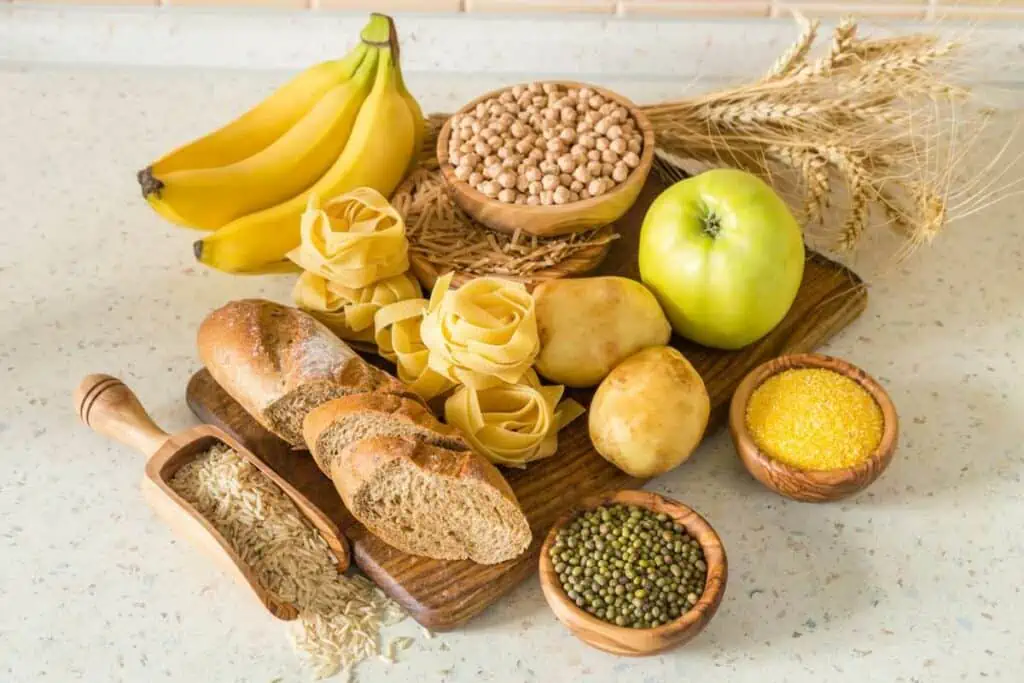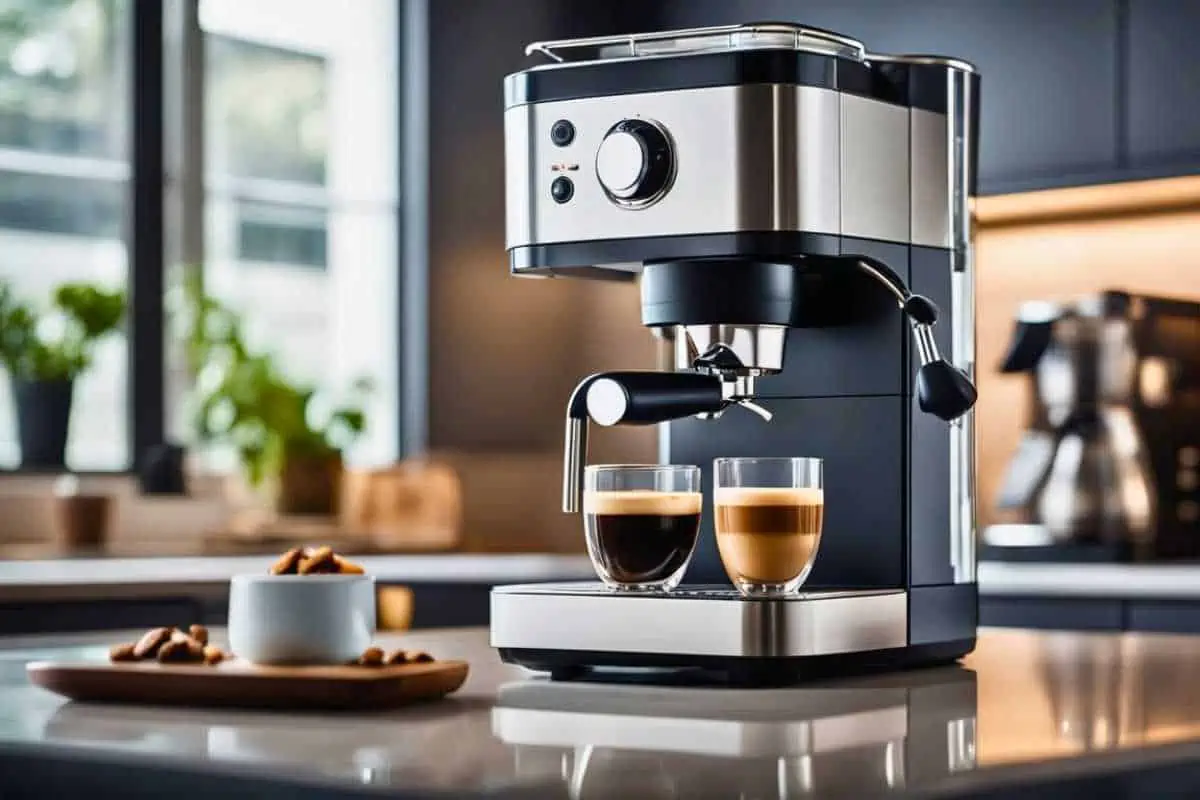If you’re a coffee enthusiast, you might have wondered whether coffee contains carbohydrates. It’s a relevant question, especially if you’re monitoring your carb intake for dietary or health reasons.
The carb content in coffee depends on how it’s made and what gets added to it. For instance, plain black coffee with no additives like milk or sweeteners has virtually zero carbs. However, the number of carbs in your coffee can increase with added ingredients or by using different brewing methods.
As you enjoy your daily cup of coffee, knowing more about its potential carb content can help you maintain your desired dietary balance. With this understanding, you can continue indulging in your favorite beverage without compromising your health goals.

Does Coffee Have Carbs?
In this section, you’ll learn about the carbs in coffee, including black coffee, espresso, and instant coffee.
Black Coffee
When it comes to black coffee, which is made by brewing coffee grounds with hot water, you can generally expect very minimal carbohydrates.
In fact, a typical cup of black coffee contains less than 1 gram of carbohydrates, making it a suitable option for those following low-carb diets, such as keto.
Espresso
Espresso, a concentrated coffee beverage made by forcing hot water through finely-ground coffee, also contains minimal carbohydrates.
Similar to black coffee, espresso typically has less than 1 gram of carbs per serving. It’s important to note that adding any milk, cream, or sweeteners to your espresso will increase the carbohydrate content.
Instant Coffee
Instant coffee is made from coffee beans that have been brewed, dehydrated, and ground into a powder. The carbohydrate content in instant coffee is slightly higher than that of black coffee and espresso, but still less than 1 gram per serving.
As with espresso and black coffee, adding milk or sweeteners to instant coffee will raise the carb count.
Popular Coffee Drinks
When opting for coffee drinks with added ingredients, such as lattes, cappuccinos, or mochas, the carbohydrate content will naturally be higher. Some examples of carb content in popular coffee drinks include:
- Cappuccino (12-ounce, made with 2% milk): 10 grams of carbs
- Latte (12-ounce, made with 2% milk): 15 grams of carbs
- Mocha (12-ounce, made with 2% milk): 33 grams of carbs
To maintain a low-carb diet, it’s best to stick to black coffee, espresso, or instant coffee, and be mindful of any additional ingredients you choose to add.

How Additives Affect Carb Content
While black coffee is virtually carb-free, adding certain ingredients can increase its carb content. In this section, we will discuss how sugar, milk, cream, flavorings, and sweeteners can affect the carb content of your coffee.
Sugar
Adding sugar to your coffee can significantly increase its carb content. One teaspoon (4 grams) of sugar contains about 4 grams of carbohydrates.
Consuming excess sugar may contribute to weight gain and other health issues, so it’s essential to be mindful of how much sugar you add to your coffee.
Milk and Cream
Milk and cream both contain carbohydrates. For example, a 1:1 ratio of black coffee to steamed milk in a café au lait can give you around 6 grams of carbs. Additionally, whole milk has about 12 grams of carbs per 8-ounce cup (240 ml).
Cream, on the other hand, has fewer carbs but can add more fat and calories to your coffee. If you want to manage your carb intake, consider using almond milk, coconut milk, or other non-dairy options that are lower in carbs.
Flavorings
Flavored coffee often contains higher carb content due to added syrups and other flavorings. For instance, a mocha coffee may have 7 grams of carbs per 7 ml of syrup. It’s crucial to check the nutrition facts of the flavorings you use in your coffee and opt for sugar-free alternatives when possible.
Sweeteners
Using alternative sweeteners can help manage carb content while still satisfying your sweet tooth. Some low-carb options include stevia, erythritol, and xylitol. These sweeteners provide sweetness to your coffee without the added carbs that regular sugar does. However, it’s still essential to use them in moderation to avoid any potential health issues.
Low-Carb Coffee Options

When you’re looking for coffee choices that are low in carbohydrates, some options are better suited to your needs than others. Let’s explore a few popular low-carb coffee beverages that can be enjoyed while maintaining your carb count goals.
Bulletproof Coffee
Bulletproof coffee, also known as keto coffee or butter coffee, offers a rich, satisfying drink that not only contains very little carbs but also provides additional health benefits.
This beverage is typically made by blending black coffee with unsalted grass-fed butter and medium-chain triglyceride (MCT) oil. It is a popular choice among those following a ketogenic or low-carb diet, helping to keep energy levels up and curb hunger.
- Taste: Rich and creamy
- Carb count: Less than 1 gram of carbs
- Benefits: Energy booster, appetite suppressant, and potential cognitive enhancer
Unsweetened Iced Coffee
Another great low-carb coffee option is unsweetened iced coffee.
By simply pouring freshly brewed coffee over ice, you can create a refreshing and delicious drink that’s also low in carbs. To make your iced coffee even more enjoyable, consider adding some unsweetened almond milk, heavy cream, or a sugar-free sweetener of your choice.
| Tasting notes | Standard prep | Low-carb additions |
|---|---|---|
| Crisp, refreshing, and mildly sweet | Coffee, ice | Unsweetened almond milk, heavy cream, or sugar-free sweetener |
By choosing options like bulletproof coffee or unsweetened iced coffee, you can easily incorporate low-carb coffee beverages into your daily routine.
Experiment with different ingredients and brewing methods to find the perfect combination that suits your taste buds and supports your nutritional goals.
What Are Carbohydrates?
Carbohydrates, commonly known as carbs, are an essential macronutrient found in various food sources. They provide your body with energy, playing a crucial role in your daily activities and bodily functions.
Carbohydrates are typically classified into two main categories:
Simple Carbohydrates
Simple carbohydrates, also known as sugars, are quickly absorbed by your body. They provide a rapid energy boost and are found in both natural and processed foods. Natural sources of simple carbs include fruits, milk, and honey, while processed sources involve sugary snacks, candy, and soda.
Some common types of simple carbs are:
- Glucose
- Fructose
- Sucrose
Complex Carbohydrates
Complex carbohydrates, or starches, consist of longer chains of sugar molecules. They take longer to digest and provide a more sustainable energy source than simple carbs. Examples of complex carbs are found in whole grains, legumes, and starchy vegetables.

Examples of complex carbohydrates include:
- Starches, found in grains, legumes, and potatoes
- Fiber, found in fruits, vegetables, and whole grains
Incorporating a balance of both simple and complex carbohydrates in your diet is essential for ensuring you receive the necessary nutrients and energy to maintain a healthy lifestyle.
Coffee Nutritional Facts
Calories and Macronutrients
When it comes to coffee, plain black coffee without any added milk or sweeteners has very minimal calorie and macronutrient content:
- Calories: 2.4
- Fat: 0g
- Sodium: 4.8mg
- Carbohydrates: 0g
- Fiber: 0g
- Sugars: 0g
- Protein: 0.3g
However, keep in mind that the nutritional content of your coffee can change significantly depending on the type of coffee beverage and any additions you choose to make, such as milk, cream, or sweeteners.
For example, a café au lait made with a 1:1 ratio of black coffee to steamed milk contains approximately 6 grams of carbs.
Vitamins and Minerals
Coffee is a source of various vitamins and minerals, but the amounts may vary depending on the brewing method and serving size. Some of the nutrients you can find in a typical cup of brewed coffee include:
- Caffeine: approximately 95 mg per 8-ounce cup
- Vitamin B2 (riboflavin): contributes to energy production and cell growth
- Magnesium: assists with muscle and nerve function, and blood sugar control
- Potassium: approximately 118mg per cup, which helps with nerve function and blood pressure regulation
In addition to these vitamins and minerals, coffee also contains various plant chemicals, such as polyphenols (including chlorogenic acid and quinic acid) and diterpenes (including cafestol and kahweol), which can have antioxidant effects and contribute to the overall health benefits of coffee.
Conclusion
In your quest to understand the carbohydrate content in coffee, you may have realized that it highly depends on how the coffee is prepared and served. A simple cup of black coffee, espresso, or Americano contains minimal to zero carbs, making them an ideal choice for those limiting their carbohydrate intake.
However, when it comes to specialty coffee beverages such as lattes, mochas, and cappuccinos, these often contain a significant amount of carbohydrates due to the addition of milk, sugar, and other flavorings. For instance:
- Cappuccino, 10 grams of carbs
- Latte, 15 grams of carbs
- Mocha, 33 grams of carbs
Keep in mind that these figures may vary depending on the size and specific ingredients used in your coffee drinks.
To maintain a low-carb lifestyle while still enjoying your cup of coffee, consider opting for black coffee or Americanos, or customize your specialty drinks with alternative milk options and sugar-free sweeteners. Being mindful of your coffee choices can help you accommodate your daily carbohydrate limits without sacrificing your love for coffee.
My name is JP and I am an avid coffee lover. Since I began college and realized what a heavy load writing majors took on, I have been a fan of the bean juice.
My job took me all over the US on book tours and press conferences, and my favorite part about the trip was exploring the best places to grab my cup of Joe.





